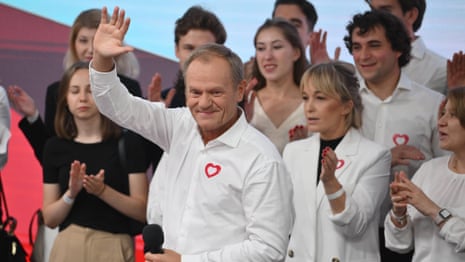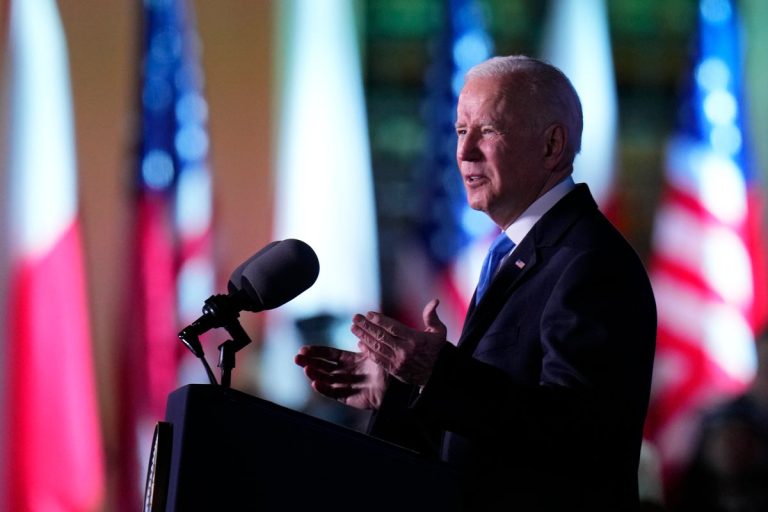A reason to be hopeful: in Poland they’ve kicked out the rightwing populists. Britain can too | Polly Toynbee

In a darkening world, a radiant beam shines out from Poland. Look, it is possible to push back the authoritarian populist tide. Extreme rightwingers who sack judges, try to silence opposition journalists, impose a near-total abortion ban and create what activists decry as “gay-free zones” can be overcome. Unprecedented numbers can be persuaded to vote, including usually reluctant young people.
Britain, where one party of the right nearly always wins, with the press dominated by plutocrats and an electoral system warped to favour the Tories, has lessons to learn from how Poland’s Law and Justice party (PiS) was vanquished. Labour will have watched the campaign of Donald Tusk’s Civic Platform party and the other anti-PiS parties that are about to form a coalition.
True, the Tories aren’t PiS – Labour can’t quite claim a Rishi Sunak win risks an existential crisis for democracy – but there are important similarities. Poland suffers many of the same deep cultural, social and class rifts, where its city dwellers contrast with small-town and rural voters; between working and middle class; old and young; graduates and the less qualified; between those strongly identifying with locality and nation, and those sharing a wider internationalist identity. These gulfs are similar to those brutally widened by our great Brexit schism.
The politics professor and polling analyst Robert Ford and his Polish wife, Professor Maria Sobolewska, have been watching the Polish election heart in mouth. Ford’s forthcoming report shows how education is becoming the key UK voting marker, as in Poland and elsewhere.
‘The more educated you are, the more left you go’ … Civic Coalition members outside the Warsaw School of Economics. Photograph: Attila Husejnow/SOPA Images/Shutterstock
But first, Labour should consider his analysis of the electoral system: under Britain’s first-past-the-post system, Ford says, PiS would have won this election with its 35.4% of the vote. Instead, a proportional system allowed three parties opposing PiS to draw seats according to their voting strength. Tusk’s Civic Platform party got 30.7%; the centre-right Third Way picked up 14.4%, drawing some former PiS voters who wouldn’t have voted for Tusk; while Lewica on 8.6% likewise drew in leftwing and younger voters. Under first past the post, seats for the smaller parties would have vanished and PiS would have won, just as David Cameron did in 2015 when the Tories received 37% of the popular vote.
You might think a formally united opposition would do better, but in Hungary and Turkey they tried that: the anti-Orbán and anti-Erdoğan united oppositions lost, failing to entice people who didn’t want to vote for a bloc that included elements they hated. In the UK, many hold their noses in the polling booth. Though proportional voting would let in Faragists, as it lets in the far right across Europe, the Polish experience suggests having real choice can protect democratic values.
The next encouraging lesson from Poland, says Ford, is that charisma isn’t all: a dullish, serious, middle-aged leader can attract flocks of young voters, as more of them voted than over-60s. For any who sneered at Labour’s conference wrapped from head to toe in union flags, Tusk rallies amassed red-and-white Polish flags: to rescue your country from the right’s destructive clutches, don’t let them pretend they are somehow more patriotic.
 Poland’s Donald Tusk declares election victory with possible coalition – video
Poland’s Donald Tusk declares election victory with possible coalition – video
Another similarity: education. The more educated you are, the more left you go, and each cohort of young people gets more educated. “Postgraduates are off-the-scale left,” Ford tells me. Graduates are already the largest UK group in every cohort under 50, he says, so Labour’s future looks bright. But there are not yet enough of them and other further education diploma holders to win.
Older people are the least educated, most rightwing and the most authoritarian in attitudes to crime, immigration and patriotism. Labour – like Tusk – is rightly wary of its graduate image, remembering Hillary Clinton’s appalling contempt for Trumpites as “deplorables”. But when it comes to the cost of living and Britain’s broken public services, there is far more in common than that which divides.
But there are problems: graduates cluster together, living in the same places, diminishing their voting power under first past the post, while non-graduates are geographically spread. Here’s another danger. If a Labour government disappoints them, it risks losing those fickle, younger voters to Greens or Liberal Democrats. The task is to not take them for granted in power, but bind them in with strong policies, especially on the climate crisis.
Education, education, education should be every leftwing party’s primary investment, as England’s teacher-starved schools fall apart. But you may have noticed Sunak rubbishing university “rip-off degrees” again in his conference speech: that’s pure electoral cynicism. The Tory-influencing thinktank Policy Exchange’s wish list for the king’s speech includes nothing about the cost of living or public services, but a cynical plea: “Capping the number going to university each year” (for other people’s children, not theirs, I’d guess). And this: “Any attempt to change the voting system or lower the voting age must be approved by the British people in a referendum.”
Tories always shamelessly warp things their way, so let Labour not be squeamish. Lowering the voting age is official Labour policy: even if it doesn’t make the manifesto, there’s no need for a referendum, as Scotland and Wales already did it without one. It wouldn’t add many people to the register, but as a symbol of trust in climate-concerned youth, it would help summon the same droves of young people who queued for hours to vote for a better future in Poland.






